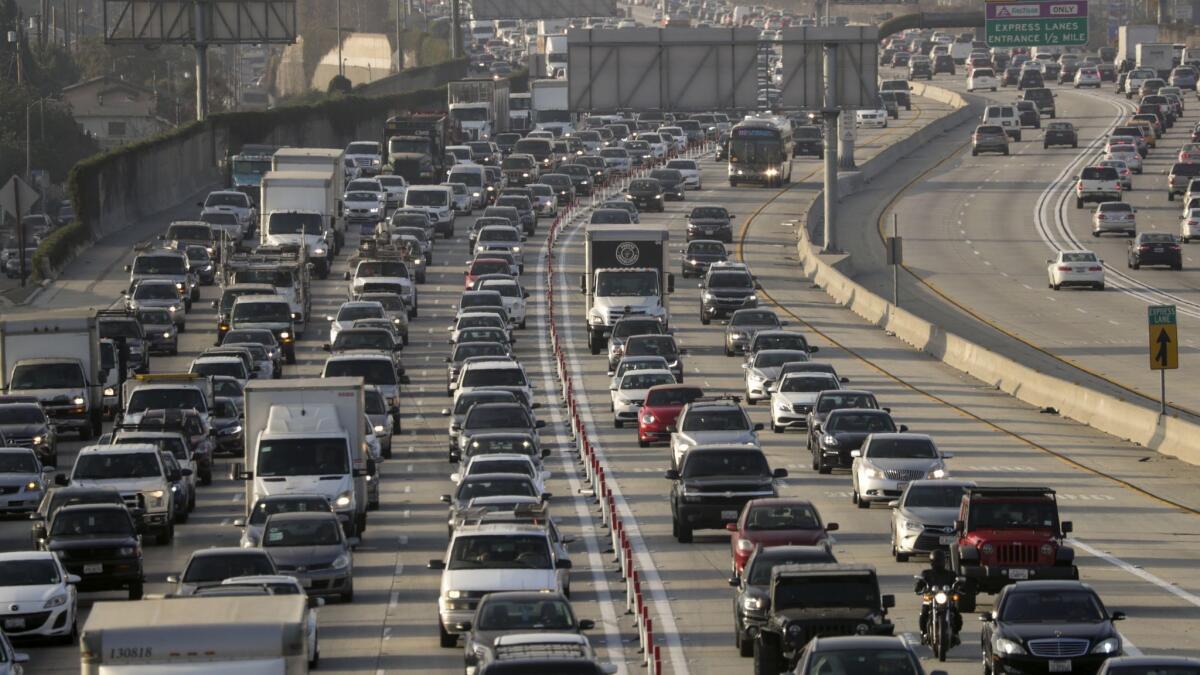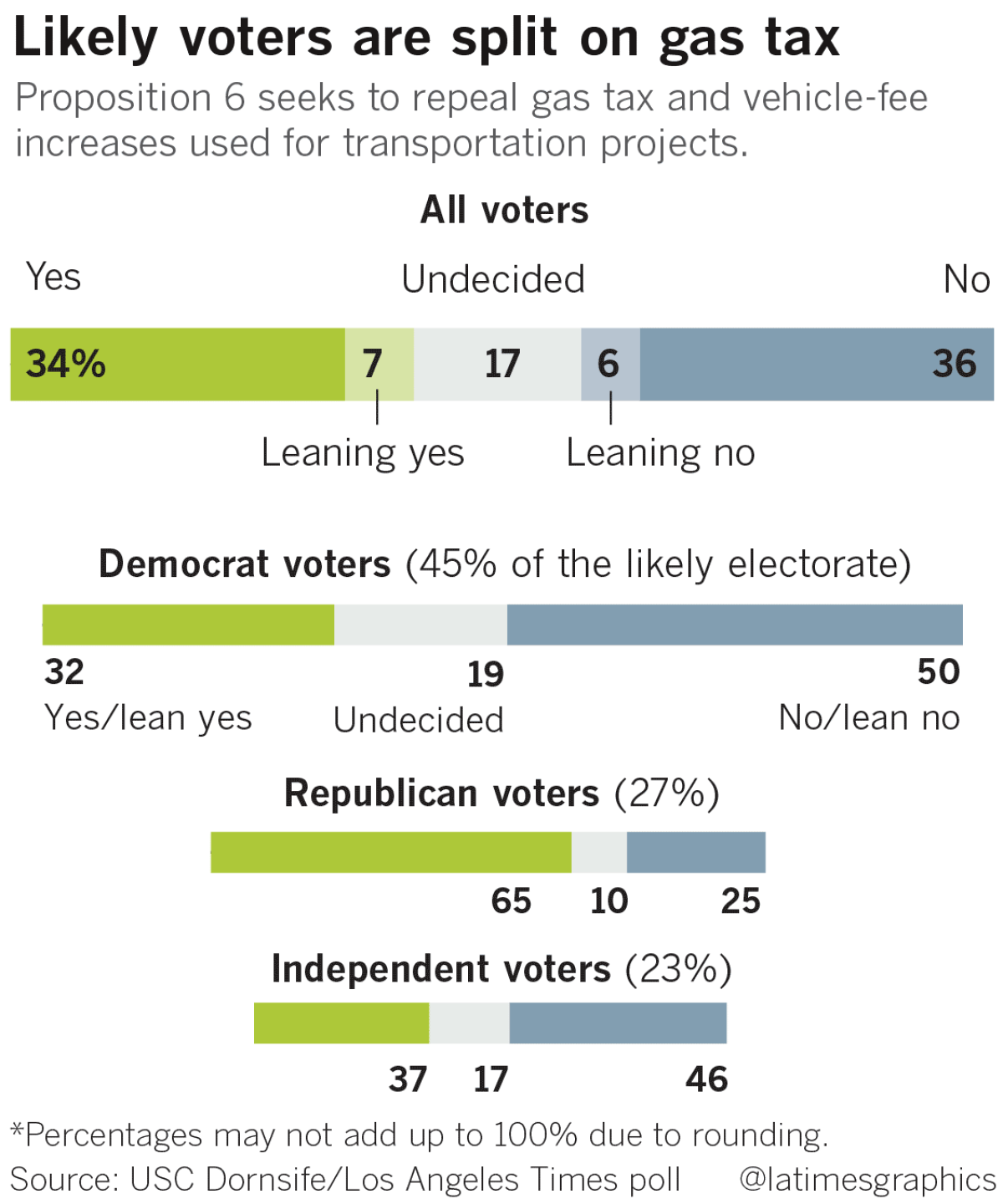Initiative to repeal gas tax increase is falling short, according to poll of California voters

Reporting from Sacramento — A California initiative that would repeal gas tax increases is falling well short of the majority support needed to pass, according to a new USC Dornsife/Los Angeles Times poll, jeopardizing a Republican strategy to use the measure to draw conservatives to the polls next month in hopes of helping GOP candidates in congressional and legislative races.
Despite the Republicans’ best efforts to make repealing the new taxes a decisive issue in the state’s midterm election, 17% of California voters are undecided and nearly half are not familiar with the initiative, the statewide poll found.
The initiative would repeal a law signed last year by Gov. Jerry Brown that raised the base excise tax on gasoline by 12 cents a gallon, increased taxes on diesel fuel and created a new annual fee ranging from $25 to $175 based on the value of a vehicle.
Brown and Democratic legislative leaders argued that the more than $5 billion to be raised annually by the new levies is needed to help the state tackle a $130-billion backlog of road and bridge repairs in California.
The poll result sets up a scramble for uncommitted votes by Proposition 6 proponents who are running low on campaign cash and are up against a $40-million opposition effort by the construction industry, labor groups and Democratic leaders including Brown.
House Speaker Paul D. Ryan (R-Wis.) and the party’s candidate for California governor, John Cox, helped put the initiative on the Nov. 6 ballot in hopes it would help GOP candidates by creating a surge of conservative voters.
With the election looming in three weeks, 41% of likely voters said they support Proposition 6 or are leaning toward supporting it after reading the official ballot title and description online. The poll found 42% are in opposition or leaning that way, while 17% remained undecided with no leanings.
The latest poll numbers indicate that the campaign against Proposition 6 has created doubt among voters around the risks of repeal, said Robert Shrum, co-director of USC’s Center for the Political Future and a longtime Democratic strategist.
“The proponents of the gas tax, who seem to have a fair amount of money, have turned it away from just being the gas tax, to being: ‘Are you going to drive on unsafe roads? Is your bridge going to collapse? Are we not going to be able to support economic development in this state?’” Shrum said.
Proposition 6 would dismantle a transportation funding program seen by many as a significant piece of the governor’s legacy as he prepares to leave office in January. The campaign against the initiative has flooded television with ads, warning voters that the loss of the tax funds would prevent the state from fixing dangerously deteriorated roads and bridges.
Supporters of Proposition 6 raised $1.7 million to get it on the ballot, but they have added just $3.4 million since then for the campaign.
The California Republican Party, a big donor to the petition drive to qualify the measure, recently explained it has had to focus the limited resources on close legislative races.
Taxes have long been a potent issue in California politics.
In June, voters recalled state Sen. Josh Newman (D-Fullerton) as part of a campaign launched by Proposition 6 leader Carl DeMaio that focused on the legislator’s vote to approve the increase in gas taxes and vehicle fees.
Democratic Gov. Gray Davis was recalled from office in 2003 after he rescinded a law that lowered vehicle license fees, increasing what recall proponents called the “car tax.” Davis’ recall resulted in Republican Arnold Schwarzenegger becoming governor.
Mike Murphy, chief strategist for Schwarzenegger during the recall effort, said there are key differences between how voters responded to the recall of the governor over the car tax and the current initiative to repeal a gas tax increase.
The Davis recall, he said, was also propelled by the state’s electricity crisis and voter frustration with state government, and unlike Proposition 6, the car tax was tied to one politician, the governor. In addition, Proposition 6 proponents have not had the money to stoke voter outrage as Schwarzenegger did, Murphy said.
“The repeal side hasn’t quite had the dollars to really punch it through,” Murphy said, adding that proponents of the initiative haven’t gotten the level of media attention received by Schwarzenegger’s campaign. “I think if fully litigated with dollars [repealing gas tax increases] is an attractive issue, but we’re just not there yet.”
An earlier Times survey, in May, gave hope to Proposition 6 proponents, finding that 51% of registered voters in the state supported repealing the gas tax increase, but that was before voters received ballots with the official title and description.
Shrum said it appears the official title is turning more voters away from supporting the measure.
The title originally issued by the state attorney general’s office for the initiative, which was the basis of the Times poll, says in part, “Eliminates Recently Enacted Road Repair and Transportation Funding by Repealing Revenues Dedicated for those Purposes.”
The final ballot further shortened the title, and the repeal campaign said both titles are misleading.
The repeal campaign led by Cox acknowledged at a rally Thursday morning in Burbank that the ballot title is hurting their efforts, saying it fails to make sufficiently clear that the measure would repeal increases to the gas tax and vehicle fees, and instead emphasizes the elimination of funds for road repairs.
“We have a challenge,” DeMaio said at the rally on the latest stop in a statewide bus tour to get out the vote. “Because these politicians changed that title on a simple initiative, the gas tax [increase] repeal initiative, they are trying to defraud California voters of an honest election.”
As he has said repeatedly on the campaign stump, Cox said at the Burbank rally Thursday that the tax and fee increases are unnecessary.
“Instead of spending the money they have more efficiently, they decided to raise your taxes,” Cox told a cheering crowd, adding that the gas tax increase will hurt “working Californians who are already having a tough go of it in this state.”
Despite advertising from both campaigns and the arrival of ballots and voter guides in Californians’ mailboxes, the poll found 45% of voters were “not at all familiar” with Proposition 6, while 40% are somewhat familiar.
The confusion and the number of undecided voters “is perilous for both” sides, said Murphy, a longtime Republican strategist who, along with Shrum, is co-director of USC’s Center for the Political Future.
He said confusion over ballot measures has historically led people to vote against them. Proposition 6’s road to victory could be more challenging because those who oppose the gas tax increase must vote “yes” for the repeal initiative.
“The ‘yes’ people are going to need some more money to break through,” Murphy said. “This one could really break either way, but ‘yes’ has a lot of headwind.”

If the people who are undecided vote in the same pattern of those who have decided or are leaning one way, up to 49% of the total vote could be in favor of Proposition 6, according to Jill E. Darling, survey director for the Understanding America Study at USC’s Center for Economic and Social Research. However, she said, voters tend to default to a “no” vote if they remain undecided on election day.
The initiative remains popular with Republican voters, 65% of whom support or are leaning toward supporting Proposition 6. But the GOP accounts for less than a quarter of the state’s registered voters. The initiative is supported by 32% of Democrats voters and 37% of independent voters, the poll found.
Brown has been a leading proponent of raising the gas tax and vehicle fees, so it may not be a surprise that 58% of those who think he is doing a good job oppose or are leaning toward opposing Proposition 6.
Of those who disapprove of the job Brown is doing, 64% support the repeal initiative, the poll found.
The poll indicates there is a geographical split in the state over gas taxes. Proposition 6 is supported by 53% of voters surveyed in the Inland Empire and Orange and San Diego counties combined, but it is favored by only 42% of voters in Los Angeles County and just 20% of voters in the San Francisco Bay Area.
Shrum said one explanation is that voters in the Inland Empire are more conservative.
There is also a division in the state based on age. The repeal initiative is backed by 51% of voters 65 and older, and by 34% of those 18 to 44, while 41% of middle-aged voters are in favor.
The poll also found that the measure is supported by 58% of white voters without college degrees, but 30% of those with one.
The argument by the Proposition 6 campaign that it will hit the working poor hardest has not yet translated to support.
The poll found 38% of voters who make less than $50,000 support or are leaning toward supporting the initiative, while the support level is 42% for those with incomes of $50,000 or more.
The Dornsife/Times poll of 1,180 eligible California voters included 794 likely general election voters and was conducted online from Sept. 17 to Oct. 14. The poll’s margin of error is 4 percentage points in either direction for likely voters. More information about the poll is available at bit.ly/USCpolldata.
Coverage of California politics »
Twitter: @mcgreevy99
UPDATES:
12:40 p.m.: This article was updated with additional details about the gas-tax increase and a quote from Mike Murphy.
This article was originally published at 3 a.m.
More to Read
Get the L.A. Times Politics newsletter
Deeply reported insights into legislation, politics and policy from Sacramento, Washington and beyond. In your inbox three times per week.
You may occasionally receive promotional content from the Los Angeles Times.











